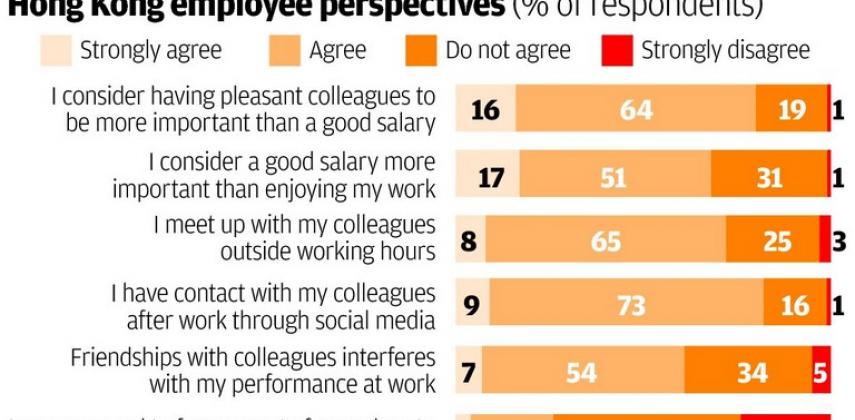Italian theologian Thomas Aquinas said: "There is nothing on this earth to be prized more than true friendship." Judging by the latest Workmonitor Index from consultancy firm Randstad, Hong Kong employees seem to concur.
Of the 810 mid-senior-level executives polled for the index, 80 per cent said having pleasant colleagues was more important than salary in determining job satisfaction. The figure was 9 percentage points above the global average - but 8 points shy of that for mainland respondents.
The survey also revealed that 82 per cent of HK employees maintain contact with their colleagues after work, particularly via social media - compared with 22 per cent in Japan.
However, the high levels of acquaintanceship do come at a price, one that employees in the city are all too aware of, with 62 per cent saying healthy relations with colleagues might interfere with their work performance.
As for the work itself, 62 per cent said they preferred a good (base) salary over an enjoyable job. One in four said their employer's financial performance was under pressure. Despite this, only 25 per cent were willing to forego part of their salary to secure their job.
Brien Keegan, director of Randstad Hong Kong, notes that employees here valued good relationships over money. "For employers, this will serve as a fresh reminder that work relationships are an absolutely important part of the fibre of work," he adds.
The report, he says, reflects the difference between individualism in some countries and the collective culture of places such as Hong Kong. It also shows such relationships can interfere with performance.
"There is a fine line between the daily social club at work and a high-performing environment where everybody has good strong work relationships," Keegan says. "To strike that balance, there is no doubt that organisations (in Hong Kong) have to construct a culture where everybody does enjoy the company of their colleagues, but that they are also working hard to achieve common goals. Where it can become impactful is when it affects employees' productivity and, of course, that will lead to other issues around politics in the workplace."
The fact that staff prefer salary to an enjoyable job confirms that salary remains a key driver for employees, he adds. "It is well-known that Hong Kong employees make shifts for salary increments... Typically around lower-paying roles, it is well-known that you will get people who will move for a very small increment in pay," Keegan says.
Although relatively fewer Hong Kong workers are concerned about their firm's financial performance, Keegan says organisations should be aware of the impact of messages they are sending staff.





